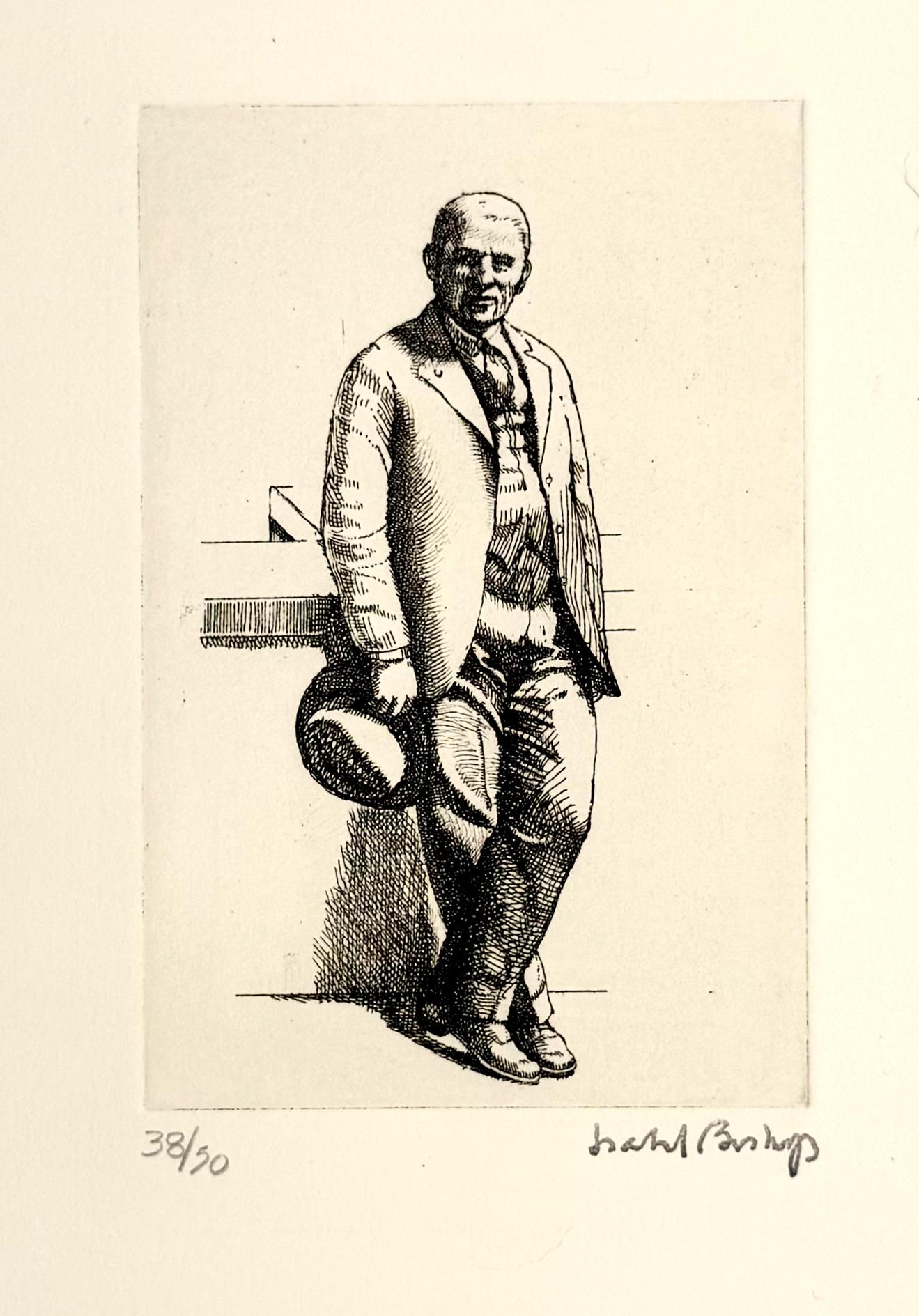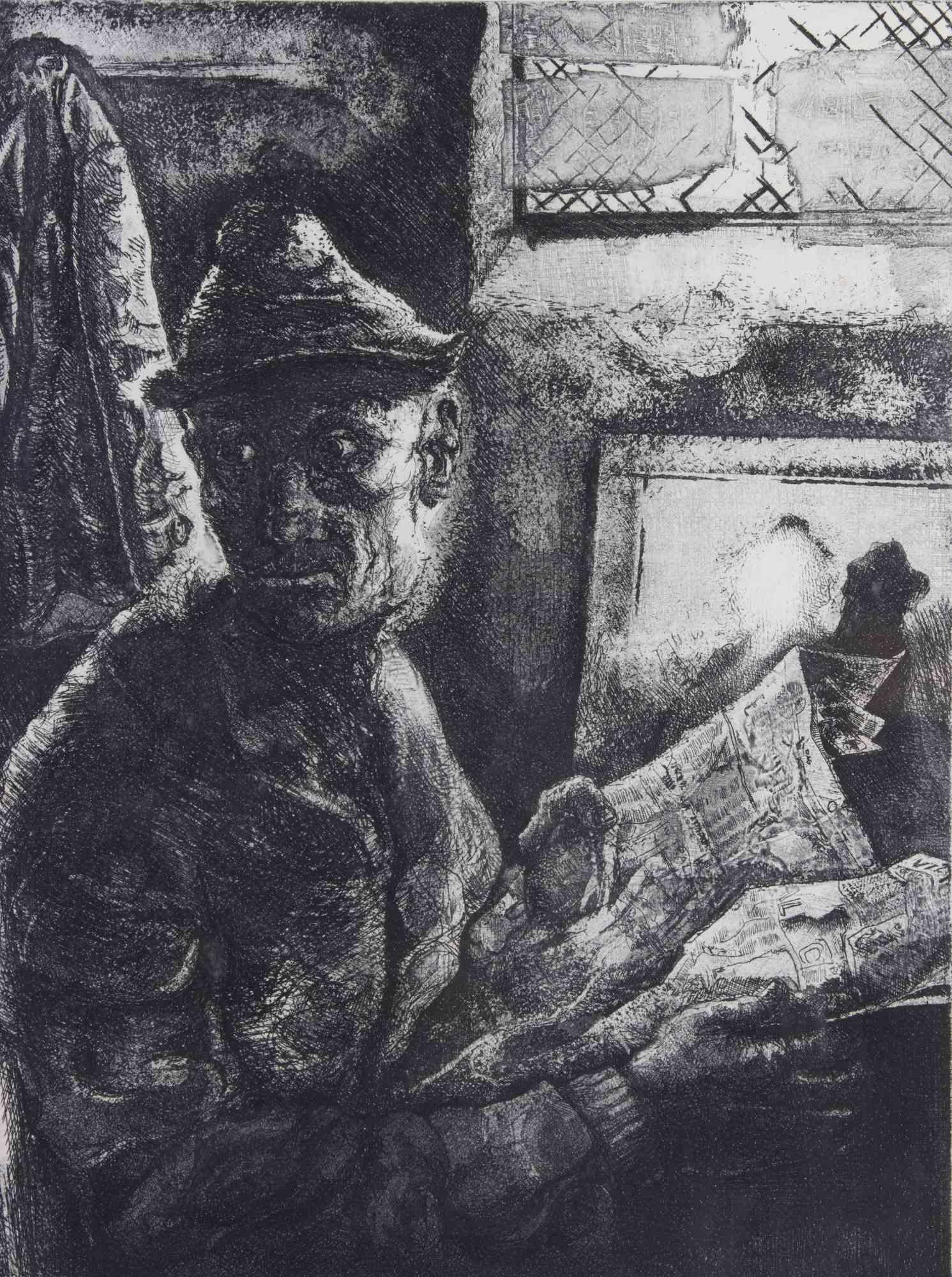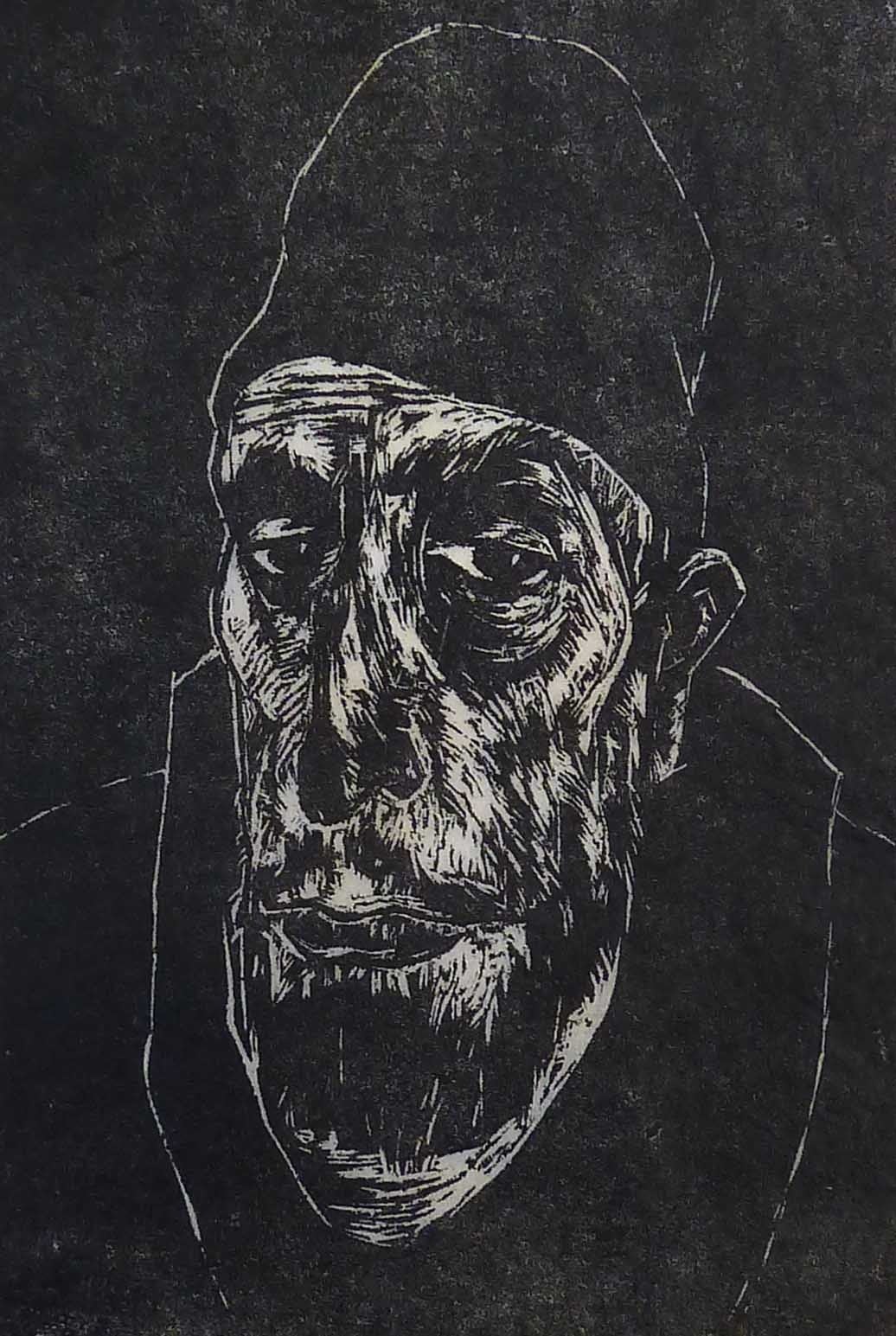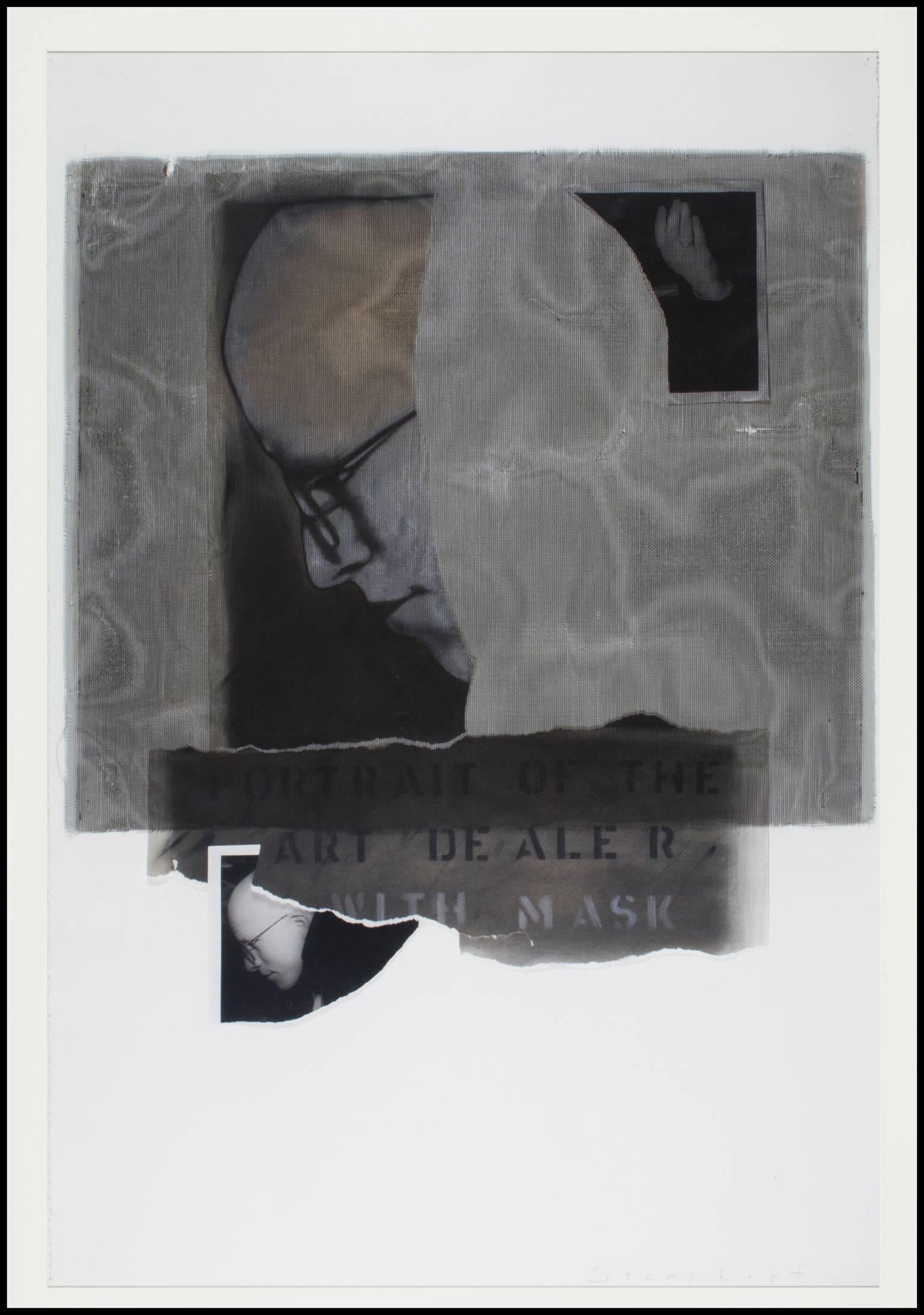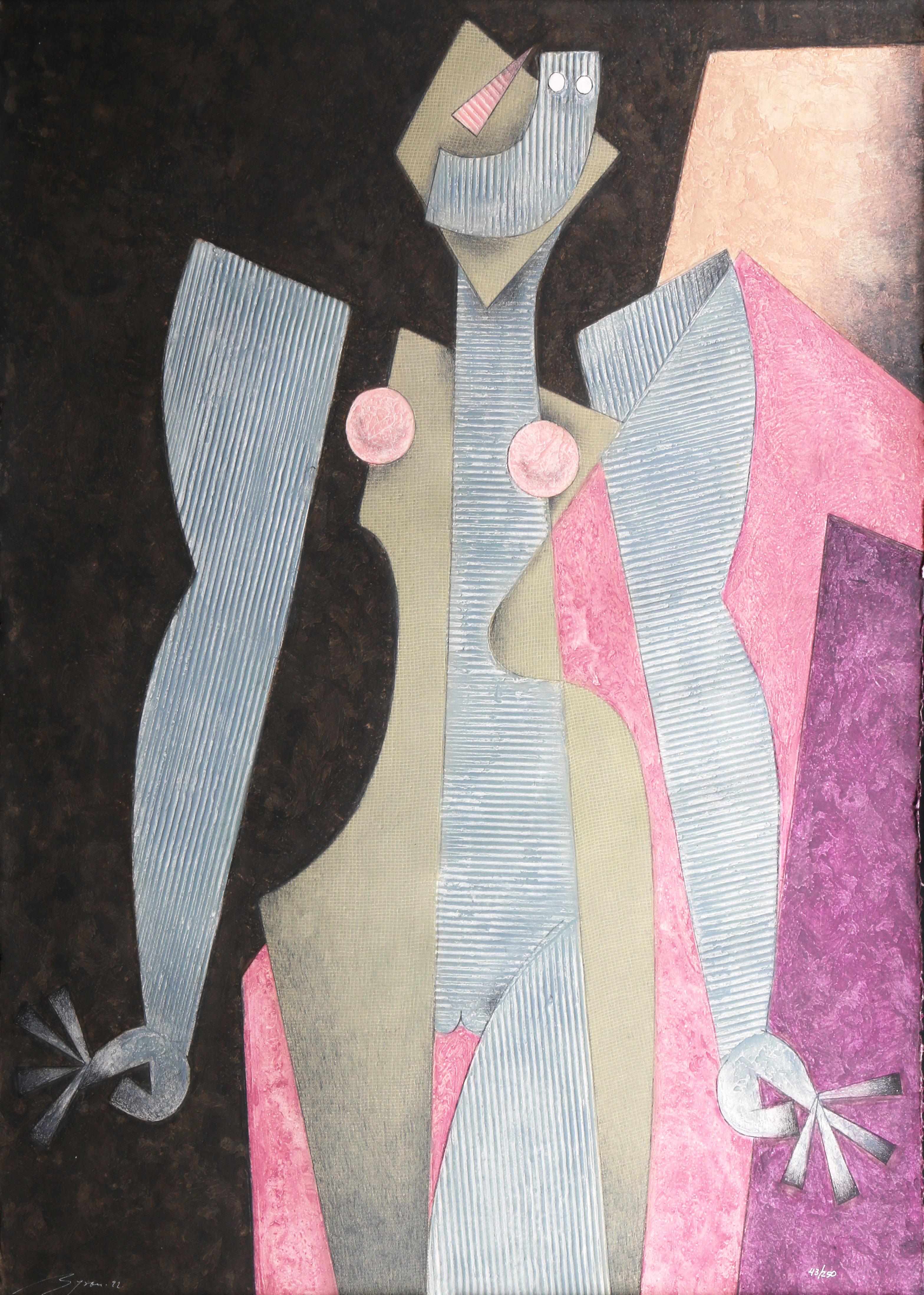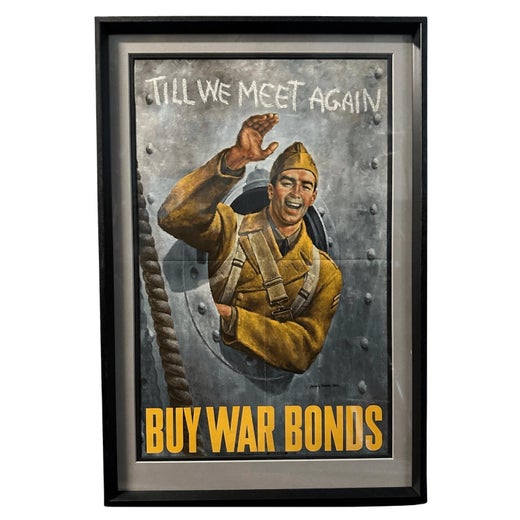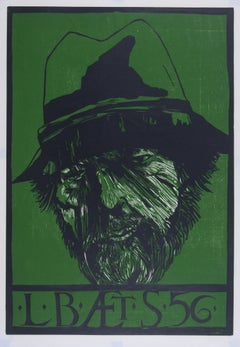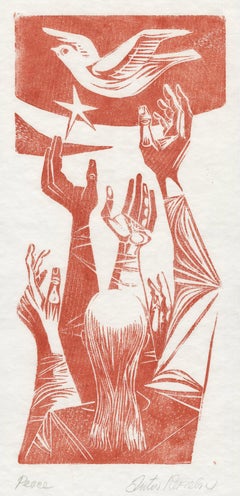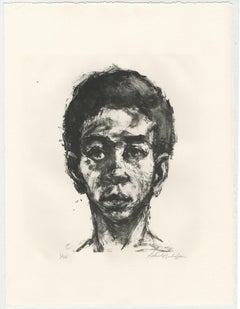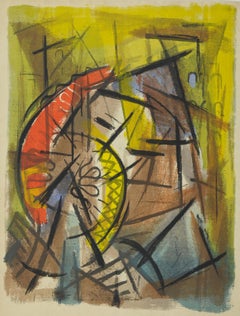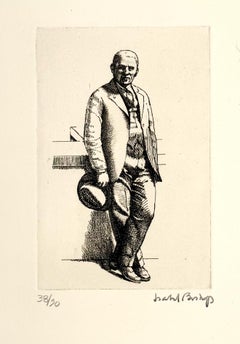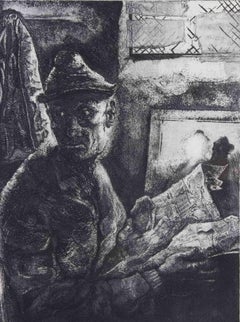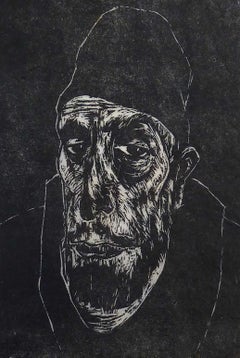Items Similar to Man with Mask
Want more images or videos?
Request additional images or videos from the seller
1 of 10
Joseph HirschMan with Mask1969
1969
$800
£620.47
€703.28
CA$1,144.94
A$1,251.08
CHF 648.60
MX$14,945.93
NOK 8,253.85
SEK 7,727.56
DKK 5,251.53
About the Item
Man with Mask
Lithograph, 1969
Signed in pencil by the artist
95/100
Printed by Lucien Detruit, Paris
Published by AAA, New York
Reference: AAA Index No. 60
Condition: Mint
Image size: 14 x 11 7/8 inches
Sheet size: 22 1/8 x 17 15/16 inches
American artist Joseph Hirsch (1910–1981) emerged at the forefront of the Social Realist art movement during the twentieth century, taking inspiration for his work from everyday events and ordinary people. Born and raised in Philadelphia, Hirsch left to pursue art in New York City in the early 1930s. This period, following the end of World War I and at the onset of the Great Depression, saw an increase in economic inequality and racial conflict. Artists such as Hirsch responded to these conditions with politically conscious art depicting poor and working-class people, labor unionists, and the disenfranchised in figurative and realistic images, known today as Social Realism. Hirsch connected art with moral responsibility, arguing, “I believe that someday the fabric of art will be threaded with morality, enabling us to distinguish evil from good. Today this is unthinkable, in the delightful art world where, excepting censorship, anything goes. But anything goes does not accord with the more discriminating ethics of our civilized code which rules out what is socially destructive.”
Banquet was created by Hirsch in 1945 for publication by the Associated American Artists (AAA). Founded by Reeves Lewenthal in 1934, the AAA created original and signed prints in editions of 250, which it distributed for $5 per print or the equivalent of about $85 in 2018. Through department store and mail order sales, as well as traveling exhibitions, the goal of the AAA was to stimulate the American public’s interest in owning fine works of art.
Hirsch’s print comments on the state of the workplace in the 1940s. Following the start of World War II, there was a high demand for workers in war-related industries. However, African Americans were often denied better-paying jobs and were discouraged from joining the military. In 1941, labor and civil rights leader A. Philip Randolph (1889— 1979) threatened a mass march on Washington, D.C., in protest of racial discrimination in industry and the military. In response, President Franklin D. Roosevelt (1882—1945) issued Executive Order 8802 declaring that “there shall be no discrimination in the employment of workers in defense industries or Government because of race, creed, color, or national origin.” Seven years later, Randolph’s advocacy led President Harry S. Truman to ban segregation in the armed forces.
Hirsch, who was white, created this print four years after Roosevelt’s executive order. He portrays two factory workers eating lunch side by side. A white man bites down on a piece of bread, while an African-American man drinks his last sip of coffee. The men are depicted in profile from a perspective that positions us—the viewers—at an equal level, perhaps as another worker on break or a fellow customer at a lunch counter. The print depicts the ideal of racial unity in the workplace and sheds light on these crucial early decades of the Civil Rights Movement.
Hirsch created this print through the process of lithography—a printing process based on the fact that grease and water do not mix. Invented in the late eighteenth century, lithography is a technique which involves drawing on a flat surface, traditionally limestone, with a greasy substance such as a crayon or a liquid called tusche. Once the image is completed and ready to print, the artist applies a chemical mixture on the surface of the stone to secure the image in place. Water is then applied to the surface, adhering to the non-greasy areas of the plate and allowing the artist to roll ink only onto the image. A sheet of paper is placed atop the stone and rolled through a press, allowing the ink to transfer from the stone to create a print. Courtesy Portland Art Museum
:“Joseph Hirsch "scribbled more than the average" when he was a boy and later remembered that his mother often gave him a sketchbook to pass the time. He won a scholarship to art school when he was seventeen and a few years later was one of the youngest painters to receive the Walter Lippincott Prize from the Pennsylvania Academy of the Fine Arts. Hirsch worked as an artist-correspondent during World War II, sketching planes and hospitals throughout the Pacific. His monumental images celebrate ordinary people and situations, reflecting his belief that "any painting that has to do with life is a commemoration." (Hirsch, Recent Paintings and Drawings: May 28-June 13, 1980, Exhibition Catalogue, 1980)
Courtesy SAAM, Washington
"Joseph Hirsch was an American artist, born in Philadelphia, Pennsylvania. He studied at the Pennsylvania Museum and School of Industrial Art before moving to New York City to study with George Luks. Luks introduced the young artist to Social Realism. He served as a pictorial war correspondent for the navy during World War II, making war posters and depicting the troops on the battlefield. Many of his drawings and paintings from this time are in the Museum of Military History.
In an interview, Hirsch once said ''I believe that some day the fabric of art will be threaded with morality, enabling us to distinguish evil from good. Today, this is unthinkable, in the delightful art world where, excepting censorship, anything goes. But anything goes does not accord with the more discriminating ethics of our civilized code which rules out what is socially destructive.''
Courtesy Old Print Shop
- Creator:Joseph Hirsch (1910 - 1981, American)
- Creation Year:1969
- Dimensions:Height: 14 in (35.56 cm)Width: 11.88 in (30.18 cm)
- Medium:
- Movement & Style:
- Period:
- Condition:
- Gallery Location:Fairlawn, OH
- Reference Number:Seller: FA8277_B1stDibs: LU14015724322
Joseph Hirsch
Joseph Hirsch was a member of the American Academy-Institute of Arts and Letters and a well-known realistic artist who came to national attention as a muralist for the Federal Works Progress Administration in the 1930's. Of his own work, Mr. Hirsch wrote: ''I believe that some day the fabric of art will be threaded with morality, enabling us to distinguish evil from good. Today, this is unthinkable, in the delightful art world where, excepting censorship, anything goes. But anything goes does not accord with the more discriminating ethics of our civilized code which rules out what is socially destructive.'' Mr. Hirsch is represented in the Metropolitan Museum of Art, the Museum of Modern Art and the Whitney in New York; the National Gallery, the Corcoran and the Hirshhorn in Washington; the Boston Museum of Fine Arts, and in many major collections in the United States. Joseph Hirsch was born on April 25, 1910 in Philadelphia, Pennsylvania. Hirsch studied at the Philadelphia Museum School, with Henry Hensche in Provincetown, Mass., and with George Luks in New York. In addition to formal study, He participated in the Works Project Administration in the easel painting division, with occasional work in the mural division, where he painted murals in the Amalgamated Clothing Workers Building and the Municipal Court. During World War II, Joseph Hirsch took part in the war effort, as an artist war correspondent, recording significant battles and events. He taught at the Chicago Art Institute, the American Art School, University of Utah, and had a significant tenure at the Art Students League in New York. He also won many awards, among them were a fellowship at the American Academy in Rome, the Walter Lippincott Prize, First Prize at the New York World's Fair (1939), the Guggenheim Foundation Fellowship (1942, 1943), and the Fulbright Fellowship (1949). In 1954 he was elected into the National Academy of Design as an Associate member and became a full Academician in 1958 Early in his career, Hirsch was introduced to the movement of Social Realism through George Luks, who was one of "The Eight". This group of painters, at the beginning of the century, chose to depict ordinary and everyday scenes. From this movement stemmed the Social Realism genre of the 1920s and 1930s. Social commentary was the backbone for the majority of Joseph Hirsch's paintings. During World War II, Mr. Hirsch went to the South Pacific, North Africa and Italy as an artist-correspondent for the Navy, and his paintings and drawings are in the Museum of Military History. . In Major Collections. Hirsch's work is represented in the Metropolitan Museum of Art, the Museum of Modern Art and the Whitney in New York; the National Gallery, the Corcoran and the Hirshhorn in Washington; the Boston Museum of Fine Arts, and other collections in the USA. He was elected to membership in the National Institute of Arts and Letters in 1967. Hirsch died in New York, NY on September 21, 1981.
About the Seller
5.0
Recognized Seller
These prestigious sellers are industry leaders and represent the highest echelon for item quality and design.
Gold Seller
Premium sellers maintaining a 4.3+ rating and 24-hour response times
Established in 1978
1stDibs seller since 2013
824 sales on 1stDibs
Typical response time: <1 hour
Associations
International Fine Print Dealers Association
- ShippingRetrieving quote...Shipping from: Akron, OH
- Return Policy
More From This Seller
View AllSelf Portrait-L.B. AET 56
By Leonard Baskin
Located in Fairlawn, OH
Self Portrait-L.B. AET 56
Color woodcut printed in black and green, 1978
Signed in pencil lower right (see photo)
Edition: 150 (97/150)
Condition: Excellent
Image: 32 x 22”
Sheet: 35...
Category
1970s American Modern Figurative Prints
Materials
Woodcut
Peace
By Anton Refregier
Located in Fairlawn, OH
Peace
Woodcut printed in orange red ink on japanese paper
Signed and titled in pencil lower right (see photo)
Titled lower left (see photo)
Created along with an illustrated book project Song of Peace, 1950-1959.
Condition: Excellent
Image: 10 1/2 x 4 7/8"
Sheet: 16 1/8 x 7";
Anton Refregier (March 20, 1905 – October 10, 1979) was a painter and muralist active in Works Progress Administration Federal Art Project commissions, and in teaching art. He was a Russian immigrant to the United States.
Among his best-known works is his mural series The History of San Francisco, located in the Rincon Center in downtown San Francisco, California. It depicts the city's history across twenty seven panels that he painted from 1940 to 1948.
Life and early career
Refregier was born in Moscow and emigrated to the United States in 1920. After working various odd jobs in New York City, he earned a scholarship to the Rhode Island School of Design in 1921. After finishing school, Refregier moved back to New York in 1925. To earn a living, Refregier worked for interior decorators, creating replicas of François Boucher and Jean-Honoré Fragonard paintings...
Category
1950s American Modern Figurative Prints
Materials
Woodcut
America's Son II (Sonny)
By Sedrick Huckaby
Located in Fairlawn, OH
America's Son II (Sonny)
Lithograph, 2016
Signed and numbered in pencil
From: America's Family II
Printer: James Reed at Milestone Graphics
Printed on Arches paper
Edition: 40, of wh...
Category
2010s Contemporary Figurative Prints
Materials
Lithograph
The Fan
By Leonard Pytlak
Located in Fairlawn, OH
The Fan
Silkscreen printed in colors, 1950's
Signed and numbered in pencil by the artist (see photos)
Edition: 40 (24/40)
Condition: very good
Image size: 25 1/8 x 19 5/8 inches
Cou...
Category
1950s American Modern Abstract Prints
Materials
Screen
Black Passion
By Rudy O. Pozzatti
Located in Fairlawn, OH
Black Passion
Aluminum plate lithograph from two plates, 1975
Signed, titled and numbered in pencil by the artist
Edition 50
Published at Lakeside Studio with the Master printer Jack Lemon
Imagery depicts the Seven deadly Sins three Roman soldiers and Simon of Cyrene, who was forced to help Christ carry the cross
One of Pozzatti's favorite works
Condition: Otherwise very good condition Soft rippling bottom margin
Image size: 20 x 28 inches (50.80 x 71.12cm)
Sheet size: 24 x 32 inches
"Painter and printmaker Rudolph Otto "Rudy" Pozzatti was born in Telluride, Colorado, on January 14, 1925. Upon graduation from high school, he received a scholarship to attend the University of Colorado in Boulder where he enrolled as an art major. In 1943, his studies were interrupted by his induction into the U. S. Army. After his discharge in 1946, he re-enrolled in the University of Colorado where he studied under Wendell...
Category
1970s American Modern Figurative Prints
Materials
Lithograph
Woman's Head
By Elie Nadelman
Located in Fairlawn, OH
Edition of 50 printed by Charles White in 1951 for the estate
Bibliography:
Lincoln Kirstein, Elie Nademan (New York: The Eakins Press, 1973),, 20
Elie Nadelman
Born 1882, Warsaw...
Category
1920s American Modern Prints and Multiples
Materials
Drypoint
You May Also Like
Joseph Hirsch, Beard
By Joseph Hirsch
Located in New York, NY
Joseph Hirsch had such empathy for his subjects! But he was also an amazingly skilled lithographer who could get extremely delicate details out of the stone. Signed and numbered in p...
Category
Mid-20th Century American Modern Figurative Prints
Materials
Lithograph
Man Holding Hat
By Isabel Bishop
Located in Middletown, NY
New York: Sylvan Cole, 1929.
Etching on white wove Rives paper with an infinity watermark, 5 15/16 x 3 15/16 inches (151 x 100 mm); sheet 15 7/16 x 11 15/16 inches (392 x 303 mm), f...
Category
1920s American Realist Portrait Prints
Materials
Drypoint, Aquatint
Man with Newspaper - Etching by Piero Cesaroni - 1973
By Piero Cesaroni
Located in Roma, IT
Man with Newspaper is anl artwork realized by the Italian artist Piero Cesaroni (Brescia, 1944) in 1973.
Original Black and White Etching on paper.
Hand-signed and dated in pencil...
Category
1970s Contemporary Figurative Prints
Materials
Etching
Jewish Man
By Fedor Loevenstein
Located in London, GB
FEDOR LOEVENSTEIN LOWENSTEIN 1901-1947
(Czech / French)
Title: Jewish Man, early 1920’s
Technique: Original Hand Signed, Numbered and Titled Woodcut on thin paper
Paper Size: 28 x 22 cm / 11 x 8.7 in
Plate Size: 14.8 x 10 cm / 5.8 x 3.9 in
Additional Information: This work is hand signed in pencil by the artist "F. Loevenstein" at the lower right margin.
It is also tilted in Cyrillic "EBPEЙ" (Jew) and numbered "19" in pencil at the lower left margins.
This work was printed in the early 1920's in a small edition. Our impression is number 19 from the edition.
Originally from Czechoslovakia, Fédor Löwenstein...
Category
1920s Cubist Portrait Prints
Materials
Paper
"Art Dealer With Mask (Portrait of David Barnett), " Mixed Media signed
By Carol Sternkopf
Located in Milwaukee, WI
"Art Dealer With Mask (Portrait of David Barnett)" is an original mixed media collage by Carol Sternkopf. It depicts David Barnett, artist and gallerist, constructed in black and white from personal photographs.
30 1/2" x 29"
BFA in Drawing from Milwaukee Institute of Art and Design
Now lives in Bend...
Category
1980s Figurative Prints
Materials
Mixed Media
Mask, Embossed Lithograph by Byron Galvez
By Byron Gálvez
Located in Long Island City, NY
From an edition of 250, this dynamic cubist nude print fractures details of the female form into matters of base anatomy. This piece is signed and numbered in pencil by the artist.
Mask
Byron Gálvez...
Category
Late 20th Century Abstract Prints
Materials
Lithograph
More Ways To Browse
Vintage Banquet
Vintage Lunch Counter
Lucky Strike Vintage Poster
Marc Albert
Marc Chagall Eiffel Tower
Marc Chagall Levi
Marc Chagall Numbered Print
Marc Chagall Romeo Juliet Poster
Marc Ferrero
Marilyn Avedon
Marilyn Crying Diamond
Marina Abramovic Poster
Martin Lewis On Sale
Marvel Stan Lee Comics
Maurice Evans
Maurice Utrillo Original
Millais Art Prints
Milton Green
